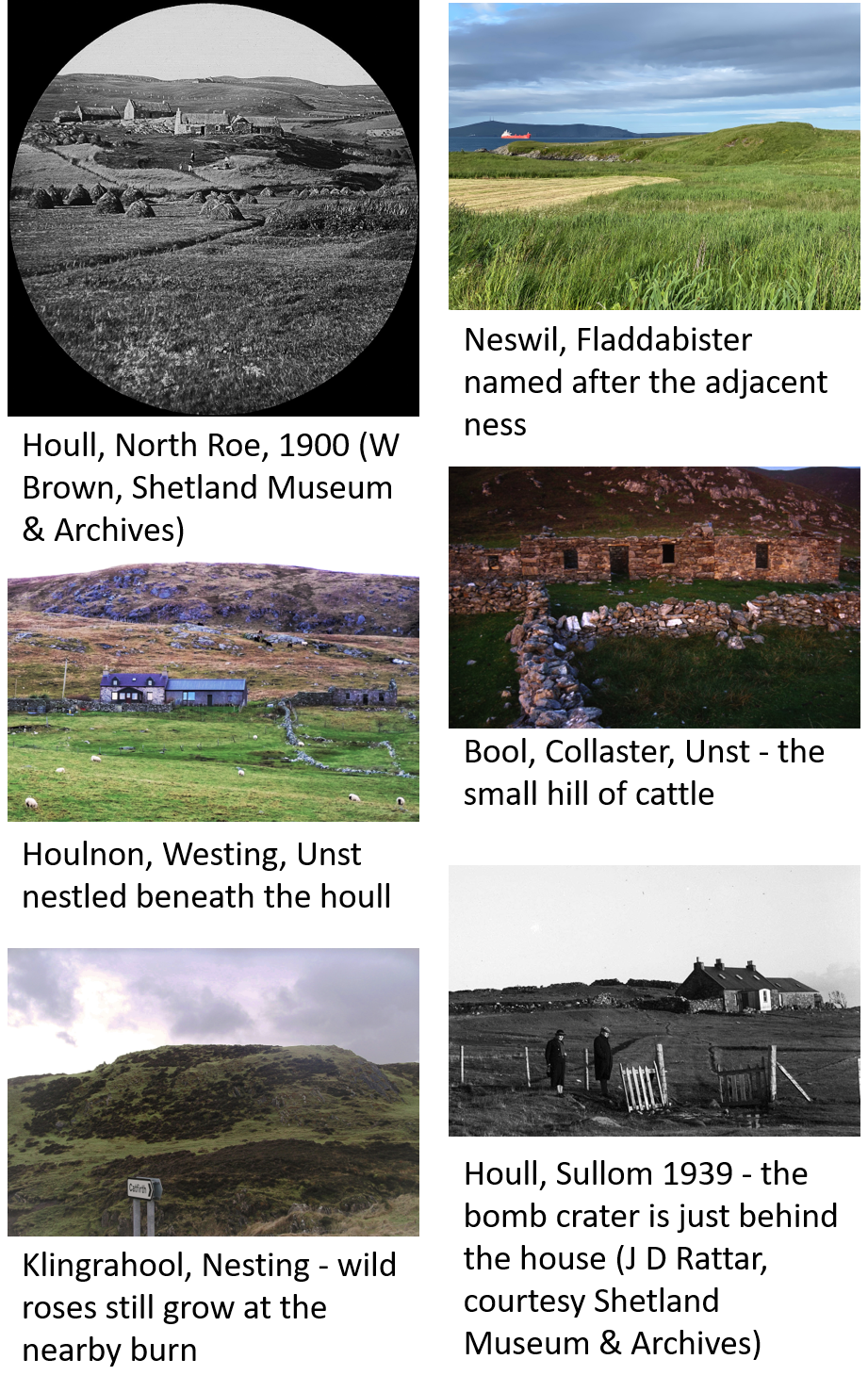Place-name of the week – Houlls
Published: 25 June 2020
 The word houll comes from the Old Norse hóll meaning a hill or height; the same feature is often described by the Scots word knowe. Similar place-names occur in Norway and Iceland but are rare in the relatively flat Orkney landscape and do not occur in Faroe. Shetland has many Houlls, from Unst to Fair Isle. Houll in Sullom is where the first bomb landed on British soil during the Second World War. Thankfully the house was unoccupied, and the only casualty was a rabbit, commemorated in the song ‘Run Rabbit Run’.
The word houll comes from the Old Norse hóll meaning a hill or height; the same feature is often described by the Scots word knowe. Similar place-names occur in Norway and Iceland but are rare in the relatively flat Orkney landscape and do not occur in Faroe. Shetland has many Houlls, from Unst to Fair Isle. Houll in Sullom is where the first bomb landed on British soil during the Second World War. Thankfully the house was unoccupied, and the only casualty was a rabbit, commemorated in the song ‘Run Rabbit Run’.
In place-names the term is also compounded with adjectives describing the position, size, adjacent features, animals, plants and occasionally people associated with the hills. The most common forms are Swarthoull/Swartwel from svartr (black), Claphoull/Clapwell from klöpp (stepping stone), Pundshoull/Punchwel from pund (enclosure), Stourhoull/Steurwill/Stourl from stórr (big), Catwell from kot (cottage) and Stackhoull/Stackwell from stakkr (stack).
It is often shortened to –wel, -wil, -wal, -el or –ol, sometimes leading to confusion in the meaning as several völlr names, meaning field, have the same ending. Another misleading form is the reduction of holmr (holm) names to a hul or houl prefix, as in Hulmalees and Houlastongas. A lack of knowledge of the root word’s meaning has sometimes led to the addition of the same term in another language, for example the Knowe of Tonquill, Knowe o Feadwall and Knowe o Wilwil. Similarly, some people have mistakenly added ‘isle’ to Burra, giving broch isle isle or ‘bay’ to Breiwick, thus meaning broad bay bay.
Trowie knowes often have houll names. Wilhoull/Wilwil originates in álfr (elf) and Görwill/Geurwill in gýgjar (giantess, troll). Skibhoull/Skibel/Skiberhoull originates in skip (ship) and these places are said to be ship lookouts or used in meids to guide boats safely into the voes at Baltasound, Burravoe in Yell, North Voe in Whalsay, Waas and Aiths Voe in Cunningsburgh. Matchishool, Wester Skeld, now called Mountfield, may derive from the man’s name Mathias or Mats, and Marratshoull in Unst could relate to a woman called Margret.
Hwinerul is the hill near the mill (kvern), Kirkhoull/Kirkel/ Kjurkwill is the knowe near the kirk and Vatshoull is the knowe near the loch (vatn). Klingrahool, Nesting is the knowe near the wild roses (klungr) and Brenwall relates to a burnt-off piece of land (brenna). Bool in Unst is the hill of the cattle (bú) and Queerwill, Fladdabister is the knowe near the cattle enclosure (kví).
Some of my favourite sounding place-names have houll as the first element - Houlnastoura (big hill), Houlenquida (white hill), Houlnagruna (green hill) and Houlanbrinda (burnt-land hill). Other examples are Houlenscarpa, Houlland, Houlalee and Hollorins. If you know any interesting houll names or stories relating to these places, please email placenames@shetlandamenity.org
Eileen Brooke-Freeman, Shetland Place Names expert, June 2020
We hope you have enjoyed this blog.  We rely on the generous support of our funders and supporters to continue our work on behalf of Shetland. Everything we do is about caring for Shetland's outstanding natural and cultural heritage on behalf of the community and for future generations. Donations are welcomed and are essential to our work.
We rely on the generous support of our funders and supporters to continue our work on behalf of Shetland. Everything we do is about caring for Shetland's outstanding natural and cultural heritage on behalf of the community and for future generations. Donations are welcomed and are essential to our work.

